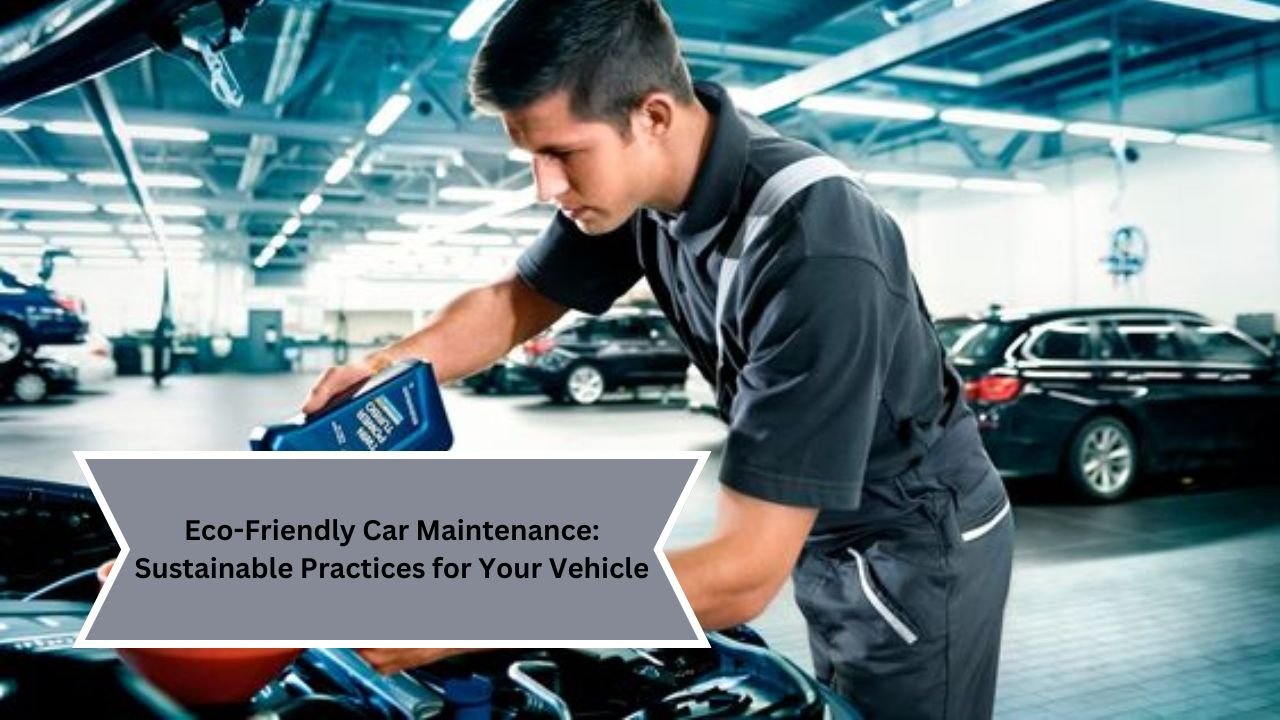As concerns about climate change and environmental degradation grow, more people are looking for ways to reduce their ecological footprint, including in their car maintenance practices. While vehicles are essential for many, their upkeep doesn’t have to come at the expense of the planet. This article explores sustainable practices that can help you maintain your vehicle while being kind to the environment.
Understanding the Environmental Impact of Vehicles
Before delving into eco-friendly maintenance practices, it’s essential to understand the environmental impact of conventional car maintenance. Traditional practices often involve the use of toxic chemicals, excessive waste, and energy consumption, all contributing to pollution and resource depletion. By adopting sustainable methods, you can minimize this impact and promote a healthier planet.
1. Choose Eco-Friendly Products
Biodegradable Cleaning Supplies
Many conventional car cleaning products contain harsh chemicals that can be harmful to the environment. Opting for biodegradable or eco-friendly cleaning supplies not only protects the environment but also ensures a safer space for you and your passengers. Look for products that are phosphate-free and derived from natural ingredients.
Recycled Oil and Fluids
When it comes to engine oil, choosing recycled or synthetic oils can significantly reduce your environmental footprint. These products are often made from reclaimed materials and are less toxic than traditional oils. Regularly check your oil levels and follow your manufacturer’s recommendations for oil changes to keep your engine running efficiently.
2. Implement Efficient Driving Habits
Fuel Efficiency
How you drive can significantly affect your vehicle’s fuel efficiency. Adopting eco-friendly driving habits, such as smooth acceleration, maintaining a steady speed, and avoiding aggressive driving, can help you save fuel and reduce emissions. Utilizing cruise control on highways can also improve fuel economy.
Reduce Idling
Idling consumes fuel and produces unnecessary emissions. Turn off your engine when parked or waiting for extended periods. Not only does this save fuel, but it also minimizes wear and tear on your engine.
3. Regular Maintenance Checks
Tire Care
Proper tire maintenance is crucial for both safety and fuel efficiency. Under-inflated tires can decrease your vehicle’s fuel economy and increase harmful emissions. Regularly check your tire pressure and ensure they are inflated to the manufacturer’s recommended levels. Additionally, rotating your tires and ensuring proper alignment can extend their lifespan and improve performance.
Engine Tune-Ups
Keeping your engine in top shape is vital for efficient performance. Regular tune-ups, which include checking the spark plugs, air filters, and fuel filters, can help your vehicle run smoothly. A well-maintained engine not only consumes less fuel but also produces fewer emissions.
4. Opt for Sustainable Upgrades
Use Energy-Efficient Lighting
Upgrading your vehicle’s lighting to energy-efficient LED bulbs can reduce energy consumption and improve visibility. LED lights last longer than traditional bulbs, reducing waste over time and requiring less frequent replacement.
Consider Eco-Friendly Tires
When it’s time for new tires, consider eco-friendly options designed to improve fuel efficiency. These tires often have lower rolling resistance, which can lead to better mileage and reduced emissions. Look for tires made from sustainable materials or those that have been manufactured using environmentally responsible processes.
5. Minimize Waste
Proper Disposal of Waste Materials
During maintenance, you may generate waste materials such as oil, filters, and tires. It’s essential to dispose of these items properly to prevent environmental contamination. Many auto parts stores and local recycling centers offer drop-off services for used oil and tires. Always check local regulations and resources for safe disposal options.
Recycle and Repurpose
When replacing parts, consider recycling old components whenever possible. Some auto shops offer incentives for returning old parts. Additionally, think creatively about repurposing items. For instance, old tires can be transformed into garden planters or swings, reducing waste while adding a creative touch to your space.
6. Explore Alternative Transportation Options
Carpooling and Ride-Sharing
Reducing the number of vehicles on the road is an effective way to decrease emissions. Carpooling with colleagues or friends not only saves fuel but also fosters a sense of community. Ride-sharing services can also be a sustainable option for getting around without relying solely on your vehicle.
Public Transportation
When possible, consider using public transportation instead of driving. Buses and trains produce fewer emissions per passenger than individual cars, making them a more sustainable choice. This can also alleviate parking issues and reduce wear and tear on your vehicle.
7. Plan Your Routes Wisely
Combine Errands
Planning your errands can help you minimize the number of trips you take. By combining multiple errands into one trip, you can reduce fuel consumption and time spent on the road. Use apps or mapping software to find the most efficient routes, taking into account traffic and road conditions.
Embrace Technology
Utilize navigation apps that provide real-time traffic updates and route optimization. These tools can help you avoid congested areas, saving time and fuel. Additionally, consider using apps that highlight nearby charging stations if you own an electric vehicle, ensuring you can maintain your car’s efficiency.
Conclusion: A Greener Future Awaits
Adopting eco-friendly car maintenance practices is not only beneficial for the environment but can also lead to cost savings and improved vehicle performance. By making conscious choices regarding the products you use, your driving habits, and how you maintain your vehicle, you can contribute to a more sustainable future.
The shift towards eco-conscious practices in car maintenance reflects a broader commitment to environmental responsibility. As more individuals embrace these practices, the collective impact can lead to significant positive changes. Whether you’re a car enthusiast or simply rely on your vehicle for daily tasks, every small effort counts in creating a greener planet.
Incorporating these sustainable practices into your routine ensures that your vehicle remains a reliable part of your life while minimizing its environmental impact. Together, we can drive toward a more sustainable future—one car at a time.

